Exchange programme for sharing Nordic-Baltic experiences
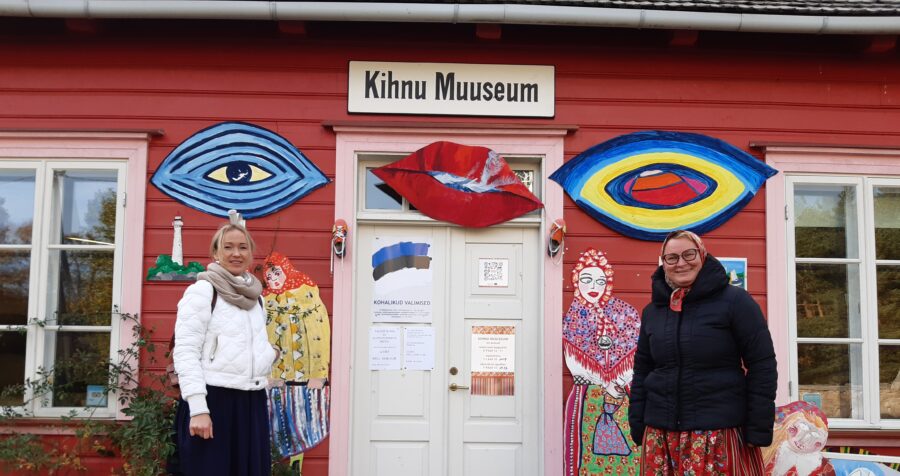
Background
The Nordic and Baltic network on Intangible Cultural Heritage was established in 2019 and the provisional aim of the network is to share good practices on community involvement in a wider scope. The informal network envisages regular meetings open for all stakeholders and domains working in the spirit of the UNESCO Convention for the Safeguarding of Intangible Cultural Heritage.
The networking and sharing of experiences (both good practices and obstacles) can help the participants with ideas and capacity building to better safeguard their own living heritage.
In the year 2021 the network launched an exchange programme supported by Nordic Culture Point: The main objective of the exchange programme is to share good practices on community involvement in the safeguarding of ICH.
ICH exchange activities included funding for six visits, where a person working on safeguarding ICH in the Nordic or Baltic region travelled for a minimum of two-day period to another organization working with living heritage.
How it was done
All members of the network (from the Nordic and Baltic regions) could apply to go on a visit or be a host for a visit in order to exchange and share good practices on community involvement. The hosts presented their activities, safeguarding methods and shared information related to ICH in their own context, and organized an audience for the visitors to share their experiences during the stay. The visitors made a short video-interview on the good practices during their visit.
From Suiti to Ålakusten- common challenges
Suiti Cultural Heritage Foundation Board member Juris Lipsnis from Latvia visited Eel Coast Cultural Heritage NGO and Kivik’s Museum (Sweden) in October 2021.
Activities during the visit included guided study tours in eastern Skåne, In-person interview with the host about NGO activities and safeguarding methods, introducing the host and other local people to the Suiti Cultural Heritage Foundation and participation in an Ålagille (an eel party or eel festival) in Tvillingaboden.
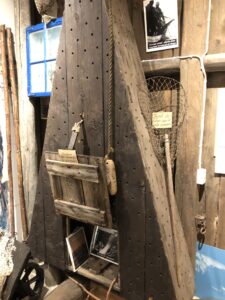
From the exhibitions at Kiviks Museum
Juris Lipsnis comments:
– During the meeting with the local people in a seminar organized by Kivik’s museum we found out that the situation in the field of the preservation of ICH in both countries – Latvia and Sweden – is quite similar. We agreed that it is very useful to share the experience of our NGOs, our ICHs and to learn about our similar struggle to maintain our ICH. Also, the seminar showed that both of us – host and me – share the same disappointment about our States and Governments, that they don’t protect the ICHs better, and that UNESCO doesn’t answer our letters or take their responsibility in governing that the States follow the UNESCO legislation. And where is the money to help us to protect and preserve?
Watch the video from the visit here.
From Suiti to Kihnu -Towards an institute of living heritage
Suiti Cultural Heritage Foundation Board member and Project Coordinator Māra Rozentāle from Latvia visited Kihnu Living Heritage NGO (Estonia) in October 2021.
The programme included a guided study tour around Kihnu island and introduction to objects related to Kihnu traditional culture, in-person interviews with the host about Kihnu culture and Kihnu Living Heritage NGO activities and safeguarding methods, introducing the host to the Suiti Cultural Heritage Foundation activities, exchanging experiences and discussion and participation in local cultural events.
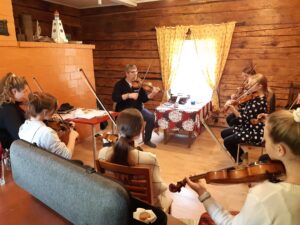
From the Kihnu visit. Photo: Māra Rozentāle
The exchange visit provided an insight into how Kihnu Living Heritage has been developed since its start in 2019. That year Mare Mätas decided to focus more on Kihnu traditional culture research and documentation activities and established a new NGO – Kihnu Living Heritage. Since the establishment Mare has conducted research and published books and magazines on topics related to Kihnu traditional culture, as well as started planning a collaboration with Estonian and foreign researchers and students. Her aim is to establish a Kihnu institute – an organisation involved in the scientific research and promotion of Kihnu culture.
Watch the video from the visit here.
From Tartu to Kaustinen. The value of accredited NGOs
PhD researcher Savannah-Rivka Powell from University of Tartu (Estonia) visited Finnish Folk Music Institute in October 2021.
The programme consisted of Indigenous Archives Conference hosted by the Sámi Archives and in Finnish Folk Music Institute in-person interviews with the host about community engagement, tours in the archives, instrument archive, and the museum.
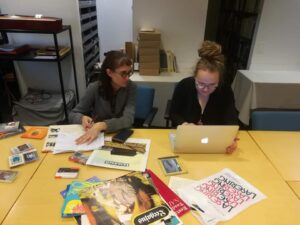
From the Kaustinen visit. Meeting with Outi Valo. Photo: Savannah-Rivka Powell
Savannah-Rivka Powell comments:
– As a PhD student conducting research on UNESCO ICH policy and the impacts it has on the community level, I found the visit to Kaustinen to be extremely informative. I was intrigued to learn of the valuable role of accredited NGOs in the efforts to support practitioners on the community level and to hear about how this is being implemented in Finland. This exchange has provided the opportunity to establish meaningful contacts with professionals and researchers working in the realm of ICH preservation.”
Watch the video from the visit here.
From Trondheim to Österbotten- The importance of coordinating
Siri Mæland and Ranveig Aas from Norwegian Centre for Traditional Music and Dance (Norway) visited Kultur Österbotten (Finland) in November 2021.
Programme consisted in “Shadowing researcher Johanna Björkholm’s workday”, visiting Lafo Folkmusik center and Lafo folkhögskola, Østerbottens barnkulturverk (BARK) and SLS/Finlands svenska folkemusikinsitut. In these meetings Johanna showed in practice how she connects different institutions to each other, establishing networks for present and future ICH collaborations.
After the visit Aas and Mæland concluded that:
– During the visit we learned about the different institutions, associations and traditional bearers Johanna works with. We observed how she uses her expertise in ICH to help practitioners and traditional bearers in different small volunteer associations with safeguarding activities of their need, to involve and exchange contacts, connecting professionals with amateurs, and providing awareness raising, visibility and accessibility.
Watch a video from the visit here.
From Helsinki to Kihnu – Knitting together
Artisan and Bachelor of Social Services Riikka Walta (Club for Sámi Crafts) travelled to Kihnu to attend the Knitting festival in April 2022.
The festival programme included knitting, guided tour around the island, museum visit, smoke sauna and films about local traditions, visit in the lighthouse, live music and dance lessons.
Watch a video from the visit here.
Riikka Walta’s comments:
– We started to knit traditional Kihnu man’s socks. Many local women participated, clad in their traditional clothing.
-They are the masters in knitting and I enjoyed their arguments on how to knit socks: Each one of them had their own style, but comparisons were made openly and in good spirit. We discussed differences and similarities in traditional crafts in diverse cultures. I had with me a book of traditional mittens in Koivisto, Karelia, and photos of traditional Sámi mittens. I left the book on the island because some women were interested in it.
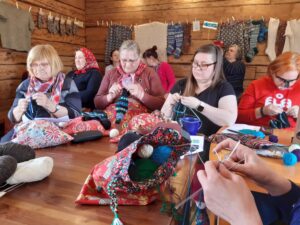
Showing different knitting styles in Kihnu Photo: Riikka Walta
Plans for further dialogue
Walta is hoping for further contacts in the future:
-For many years I have known there are a lot of similarities between Kihnu and my son’s culture from his father’s side, Aanaar Sámi people. (From lake Inari in Northern Finland, editors comment) I had hoped my son, friend, or ex-mother-in-law to join me on this trip would enable dialogue and meetings in future between these two low-population fishers’ cultures. Unfortunately, despite being extremely interested, finally none of them could travel – this time!
From Kivik to Vaasa and Kaustinen – Sharing experiences online
The Eel Coast Cultural Heritage NGO & The Kivik’s Museum & Archives Foundation, represented by Dafvid Hermansson, visited KulturÖsterbotten and Finnish Folk Music Institute in May 2022
This exchange was organised online to share information related to safeguarding intangible cultural heritage. This included introductions both from the visitor and the hosts, group and one-to-one meetings and online materials.
Watch a video from the online meetings here.
The question of finance
Dafvids comments on the exchange of information with KulturÖsterbotten:
-We talked about the differences between how NGOs are financed or not financed at all, and the problems arising from lack of financial resources to sufficient safeguarding measures in mainly private or volunteer based ICH communities. Another problem discussed was going back to normal circumstances post-Covid with e.g. entrance fees, where visitors have become used to free seminars on digital platforms.
“Resurrecting” ICH from archives- a dilemma
David further commented on the exchange of information with Finnish Folk Music Institute:
-The seminar was finished with some mutual questions of a “philosophical character”, where we both discussed the challenges of saving data for the future, and the issues of “dead” living heritages, where people from e.g. archival records, stories or photos try to reconstruct or re-enact extinct ICH:s and the problems and opportunities this awakens, but also how provocative it could be to some.
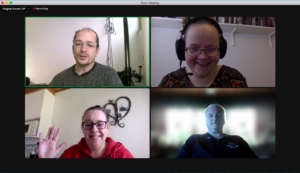
Online exchange. Screenshot from an online exchange meeting.
Short reflections and future plans
The exchange of information enriched the diversity of the good practices and spread information on elements of intangible cultural heritage in the region and their safeguarding both to practitioners, experts and the general public.
The exchange programme gives the participants an opportunity to learn from each other`s experiences and practices. During the programme they share and discuss common ideas and challenges. Such exchanges can also generate new safeguarding ideas, collaborations, and projects.
The network hopes to continue and expand the exchange of information and apply for funding for the visits between the stakeholders and domains working for the safeguarding of Intangible Cultural Heritage in the region.
During 2023 an expanded number of visits was undertaken during a new exchange project. Read more here:

